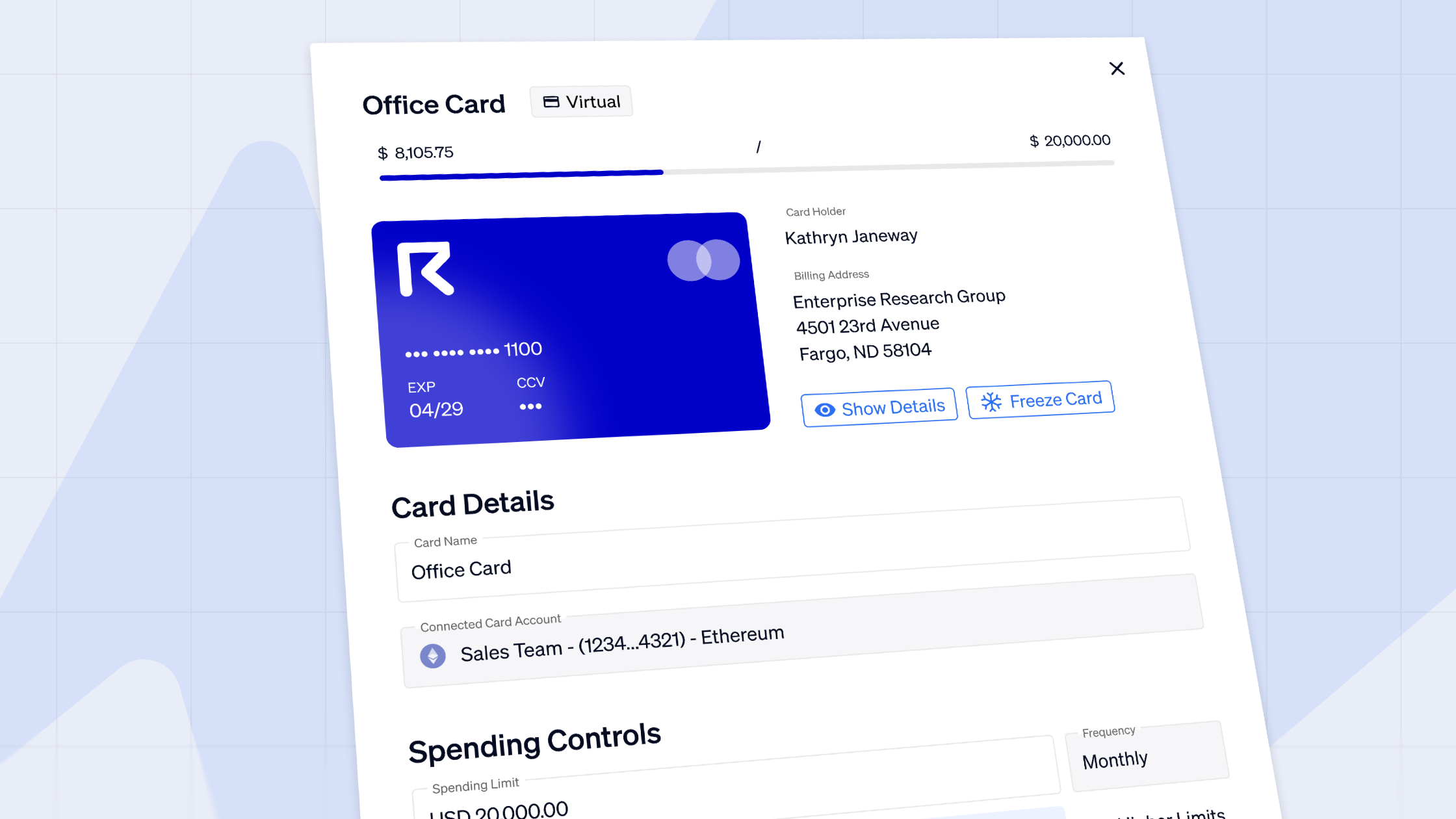Reimburse expenses in crypto: creating an efficient expense management plan
Learn how to create clear and effective crypto reiumbursement policy to simplify cross-border expenses for global teams in 5 steps.

With the world becoming more interconnected, it’s no surprise that cross-border transactions are on the rise, with a projected estimate of $280 billion by 2024. Contributing to this is the rise of remote-first teams, with members spread out across the globe.
But with this growth comes the need for faster, more efficient ways for companies to reimburse their employees for work-related expenses.
Remote teams often need to process expense claims in different currencies.Yet many businesses still find current cross-border payment processes frustrating for their delays, high costs, and lack of transparency. While payment processors like Paypal do exist to facilitate these cross-border transactions, their fees of around 5% for international transfers can be a significant expense for global teams that regularly make cross-border expense reimbursements.
Simplifying cross-border expenses for global teams
It’s clear that businesses need more efficient and cost-effective ways to reimburse their employees to thrive in today’s globalized economy. Crypto reimbursement is becoming increasingly popular.They allow for instant payment settlements without the need for intermediaries, making them faster and more efficient than traditional payment methods.
Particularly for Web3 teams who have their DAO or corporate treasuries in cryptocurrencies like stablecoins, reimbursing expenses in the same, helps to simplify matching assets and liabilities.
However, managing these expenses can be challenging.
A well-designed expense management plan can help ensure that the company’s funds are used effectively and transparently. It can also help prevent potential fraud and ensure compliance with tax regulations.
In this article, we’ll discuss how companies can create a clear and effective crypto reimbursement policy.
Ready to Supercharge Your Crypto Accounting?
Stop wasting time, manually creating journal entries. Automate your accounting now, and enjoy error-free reporting
Learn how to scale your company's crypto & fiat financial operations
Your financial complexities are our specialties. Schedule your free consultation today and discover how Request Finance can transform your financial operations
Simplify crypto and fiat financial operations today
Rely on a secure, hassle-free process to manage your crypto invoices, expenses, payroll & accounting.
What’s a crypto reimbursement policy?
A crypto reimbursement policy outlines the guidelines that dictate on what purchases can be made on behalf of the company, when and how they’ll be paid back in crypto. It specifies what types of expenses are reimbursable and gives examples of each as they pertain to work-related expenses, travel expenses, and non-reimbursable expenses.
Does my company need a reimbursement policy?
Every company where employees use their own cash or personal credit card instead of a corporate one should have a reimbursement policy in place. These expenses usually come up during event planning or traveling for work.
For example, an employee may cover the cost of an air ticket for a company trip, or treat external clients to lunch during a sales meeting. When employees make work-related purchases, they need to know how to get paid back.
Why do I need a reimbursement policy?
Having a well-defined expense reimbursement policy ensures that employees adhere to approved spending guidelines and follow proper documentation and reimbursement procedures.
This helps maintain financial discipline and prevents unauthorized or excessive expenses that could have a detrimental impact on the company’s financial health.
In the case of FTX, which faced severe financial consequences due to their reckless expenses on luxury properties, travel, and sports sponsorships that were approved via emojis on Slack, ultimately led to their bankruptcy.
When crafting a crypto reimbursement policy, it’s important to consider the company’s budget and the expected volume of crypto expenses. It’s also essential to ensure that the policy is compliant with applicable tax regulations and accounting standards.
How to create an effective crypto reimbursement policy
1. Create guidelines for what counts as reimbursable expenses
Reimbursable expenses are costs incurred by an employee on behalf of their employer that are eligible for reimbursement by the employer. In some cases, employers may reimburse employees for these expenses or provide them with a company credit card for business-related purchases.
The specific expenses that are reimbursable can vary by company, but some common examples include:
- Travel expenses: These can include airfare, rental cars, taxis, public transportation, and lodging expenses incurred during business trips.
- Meals and entertainment: The cost of meals and entertainment incurred during business activities such as client meetings or networking events may be reimbursable.
- Office expenses: Expenses incurred for office supplies, postage, printing, and copying services may be reimbursable if they are necessary for business operations.
- Education and training expenses: Reimbursement may be provided for expenses related to work-related education and training, such as tuition fees, books, and materials.
- Technology expenses: The cost of business-related software, mobile phones, and internet access may be reimbursable if they are necessary for the employee to perform their job duties.
It’s important to note that in many cases, expenses are tax-deductible, and the rules can vary depending on the country and local laws.
2. Outline how employees should report expenses
Employees should be required to submit an expense report to the HR/Finance department within two weeks of incurring the crypto expenses. The expense report usually includes the following information:
- Identity of payee
- Date of transaction
- Description of the expense
- Amount paid (If the expense was paid in crypto, the report should include the USD equivalent / desired fiat currency of the crypto spent at the time of the transaction)
- Proof of payment
- Any other necessary information required by the policy
According to the IRS, these are the documents you should keep for expenses:

3. Implement an approval process
When it comes to reviewing and approving expense claims, the HR/Finance teams typically take on this responsibility. It's their role to carefully assess the claims and ensure they comply with company policies. Once approved, employees can expect to receive their reimbursement within two pay periods, ensuring a timely and efficient process.
This approval process is crucial in preventing potential fraudulent activities and promoting a culture of transparency and accountability within the organization. Expense fraud alone makes up a significant 14.5% of all fraud cases uncovered, with approximately 5% of revenues lost to fraud on a global scale.
In cases where expenses appear excessive or transactions raise suspicions, it’s important to conduct thorough investigations. This includes closely examining claims that may be falsified or exaggerated. Should such instances be identified, appropriate disciplinary action must be taken to emphasize the importance of honesty and adherence to company policies.
4. Use an expense app to manage employee expenses
Traditional methods of collating paper receipts, screenshots of airline tickets, or hotel bookings can be a real hassle for finance teams. In fact, manual entry and routing of expense reports (62%) is reported as the top pain point in expense management.
By using an expense app to manage employee expenses, finance managers can quickly review and approve all employee expense claims in one place. A good expense app should allow teams to assign categories, review receipts, and reimburse to save time and effort for everyone involved. Companies can maintain accurate financial records, avoid unnecessary expenses, and improve overall efficiency in their operations.

For web3 teams dealing with expenses in both crypto and fiat, having an app that can handle claims and reimbursements in either currency is crucial.
Imagine purchasing conference tickets with crypto while handling meals and entertainment expenses in fiat. It’s essential for employees to have a simple and convenient way to submit expense claims while on the go.
Request Finance’s expenses app makes it super easy for finance teams to review, approve, and make mass payouts for expense reimbursements. And here’s the best part: employees can choose whether to get reimbursed in fiat or crypto.
Employees can effortlessly submit their expense claims using the mobile app, while finance teams gain full control and visibility through the desktop application.
5. Keep your employees in the loop
Making sure your employees are well-informed about the crypto reimbursement policy is key. They should have a clear understanding of how the company handles reimbursements in crypto and be trained on the proper procedure for submitting crypto expenses and supporting documents.
You can achieve this through different communication channels, like training sessions, informative emails, or internal memos.
By keeping everyone informed, you foster a culture of transparency and accountability, while ensuring that employees understand the importance of following the policy accurately.
Crypto finance tips straight to your inbox
We'll email you once a week with quality resources to help you manage crypto and fiat operations
Trending articles
Get up to date with the most read publications of the month.
Our latest articles
News, guides, tips and more content to help you handle your crypto finances.











